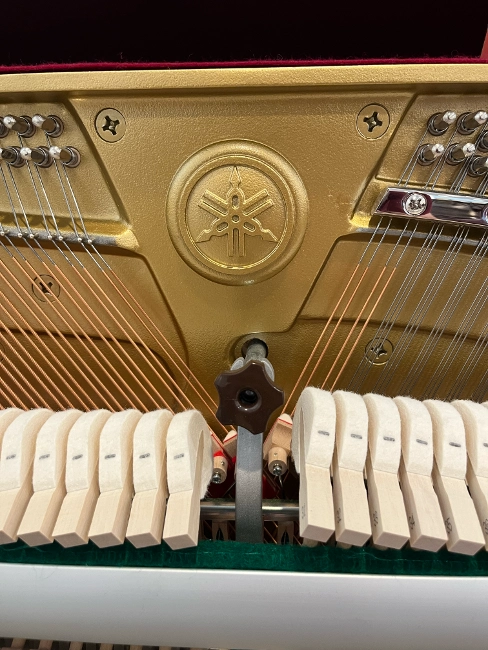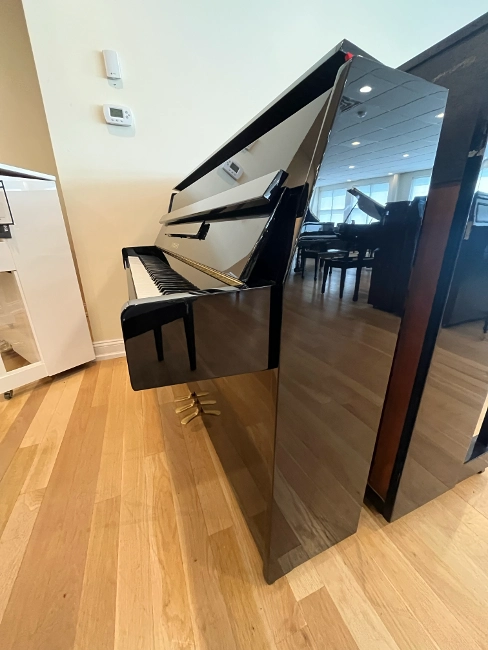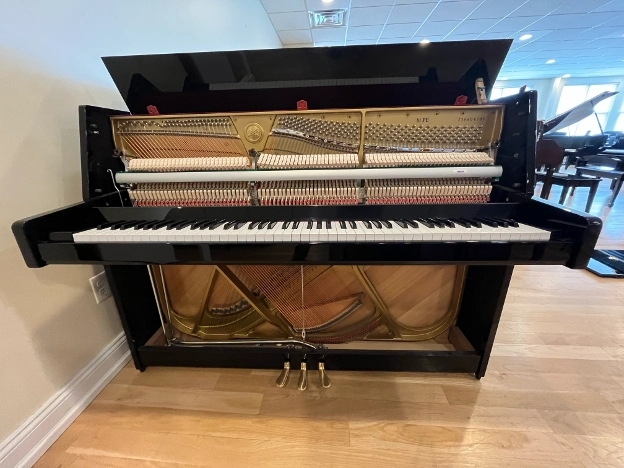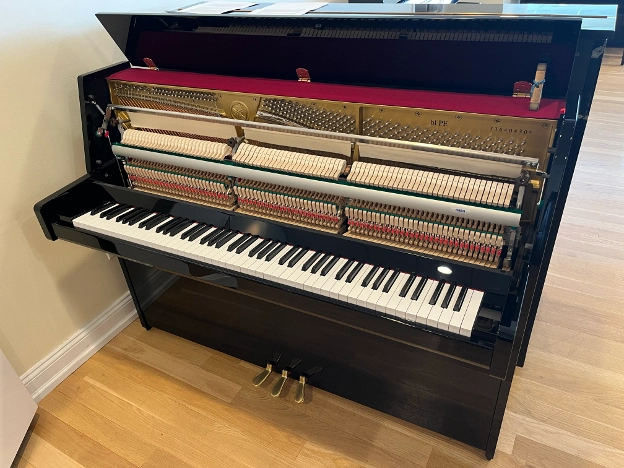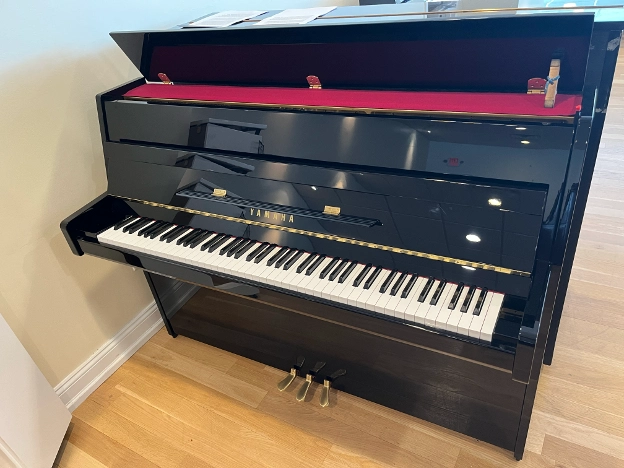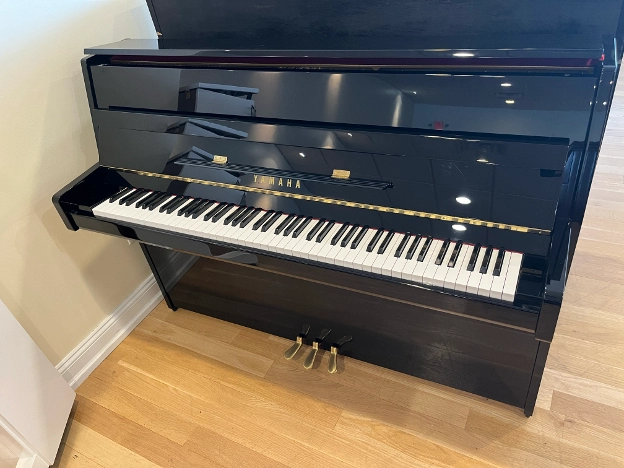Yamaha B1 Upright Piano Review by a Piano Tuner: 2025
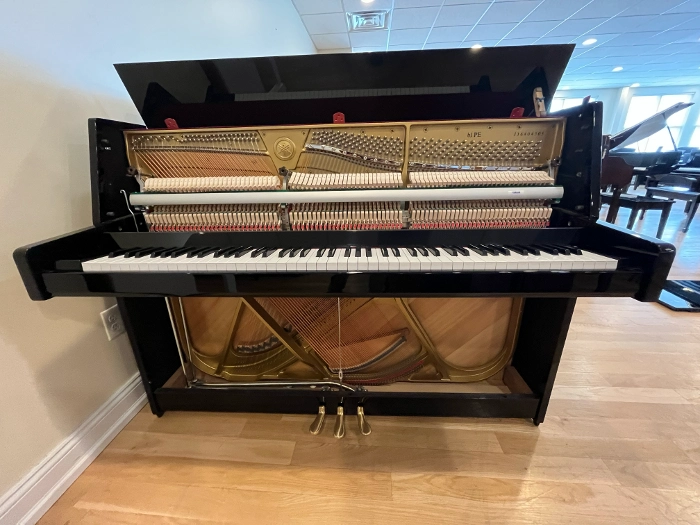
This is a brand-new entry-level B series piano, which are among Yamaha's most affordable entry-level uprights.
These instruments provide great value to those who give it a good home and regular maintenance.
As a piano technician, I recommend that this piano get tuned 2-3 times each year to get the best performance value out of the instrument. Action prep, especially on a brand new piano, is always recommended.
Take a look at Yamaha's trademark! What a wonderful logo that I believe piano tuners can be proud of!
Did you know that the Yamaha logo is 3 piano tuning forks placed in a triangle?
It's beautifully shown in the middle of the bass break of this piano.
The outside furniture was made and assembled in Indonesia, which is one way to get a basic quality piano to the market at a great price.
Plenty of customers appreciate the B series Yamahas due to their budget-friendly prices. Piano teachers also appreciate them because they often prefer acoustic pianos over digital pianos for lessons.
I typically see a lot of families with students purchase a B1 as their "starter" piano. I think as long as it's tuned regularly, and the action is prepped, this piano is a great way for students to experience a real piano.
A view of the sturdy wooden back posts encased around the soundboard. It is best to vacuum this area once in awhile to eliminate buzzes or discover misplaced items.
The simple handles on each side of the soundboard serve to move the piano around. While the handles are not ornate, they are functional for moving the piano.
The size of the furniture is condensed in terms of space, both heighth-wise and length-wise.
This is the smallest Yamaha piano amongst all models.
The Yamaha B1 weighs in at 384lbs, which makes it easier to lean the piano for repositioning when moving it to a different location.
With the case parts removed, you can see the areas where the piano technician will work on.
When tuning, the technician will work above the hammers of the pianos interior. Whereas for buzzes or pedal work, the technician will work under the keys.
This is a great view of the "belly" of the piano (minus the pinblock) where you can see the simplicity of the bridge construction, solid spruce soundboard, scale design, and the strong cast iron frame.
The simple systems related to the center mute rail pedal demonstrate Yamaha's economical design.
It's fascinating to see how Yamaha can keep the construction to the bare bones in order to deliver this piano at the most friendly price to customers, all while upholding Yamaha standards.
How much is a Yamaha B1 Upright Piano?
Email my Colleague for direct pricing: Peter Creighton Email
Peter Creighton
Need a cheat sheet for negotiating price? See the Piano Buyer Book on Amazon
Read: My Review of the Piano Buyer Book
Save thousands of dollars with this $20 book.
This is my favorite picture of the piano, opening it all up to see everything on display:
Here's what I'm reminded of when looking at this photo.
Bi-chord bass strings beyond bass break
Short action stack for its compact size
Short strings
Good looking brass pedals
Shorter key length
Solid polyester finish - Very strong
Requires action prep for improved piano playing experience
Action bracket knobs are lightweight
Short music shelf height for sheet music
10-year warranty
Pushing the keys up allows you to see the action parts at a couple of different angles.
The Yamaha-made piano hammers contain the characteristics of many Yamaha pianos. Keep in mind, that even within the brand of Yamaha pianos, the pianos themselves elicit a vast array of different tone qualities.
The quality of the hammer felt also varies depending on each tier of piano.
The model and serial number is on display in this photo.
Model: "B1"
Furniture made of Polished Ebony: "PE"
Made at the Yamaha factory in Jakarta, Indonesia: "J"
8 Digit serial number like all new Yamaha B series piano: "36404305"
The hammer rest rail shows that the action of the piano was made and designed by Yamaha.
The overhead view shows the pins of the piano, which the tuner needs to reach for a basic tuning.
Compare and Contrast a U1 vs. B1
The adjacent-superior models are the Yamaha U series upright pianos.
The U series has a better action and tuning stability.
Read more in my Technical Review of the Yamaha U1.
The lid is propped open with a piano tuners "lid prop."
The music shelf/sheet music holder is the same part as the fallboard.
Design choices like this were made to reduce production costs.
Both music shelves are compact and are economical ways to design the outside of the furniture.
This design choice was similar to the fallboard/music shelf of the W. Hoffmann V2.
Read my technical review of the W. Hoffmann V2.
With case parts closed, you can see how reflective and shiny the fresh polyester finish is on this piano. No visible scratches, just a clean new piece of furniture.
Here, you can see the inner workings of the pedals of the piano, otherwise known as trapwork.
It's not always apparent what the pedals do just by looking at it from the outside.
However, each pedal performs a different function:
Right Pedal - Sustain
Middle Pedal - Mute rail
Left Pedal - Soft Pedal
Is the Yamaha B1 worth it?
This instrument is worth it so long as normal maintenance is followed which includes a couple of things:
Tunings 2-3 times a year
Action "prep work"
Interested in a B1?
Email my Colleague: Peter Creighton Email
*Tell ‘em “Kevin B.” sent you
Need a cheat sheet for negotiating price? See the Piano Buyer Book on Amazon
Read: My Review of the Piano Buyer Book
Save thousands of dollars with this $20 book.
